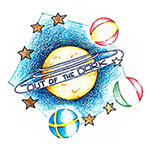Introduction
The studies and the activities planned and carried out on astronomy and mythology have inspired a play that reassumed the main themes of the project. The students have read and deepened some of the most important parts concerning the scientific discoveries made by Galileo Galilei, the serious problems he had with the Catholic Church, the process and his abjuration. On the other hand the reading of The Little Prince of A. de Saint Exupéry brought the students to focus on the voyage to unknown planets and the discovery of a new constellation, “Out of the Dark”.
Materials
Internet, books, films make research and costumes and accessories for the play.
Results
The play has been performed in Spain in the last meeting, at the end of the week. The students have played in a confident and serious way. The public composed of all the Erasmus students and the teachers have been enthusiastic of the result.
Conclusions
The value of drama in offering training in speech is proven. What is not obvious is how even abstract learning is easier when acted or demonstrated. Drama can also be used to bring scientific studies to life for the students. It is more dynamic than simple texts, and helps the visual learners as well as recycles new vocabulary.
Even the fun aspect should not be under-estimated. When the students are enjoying an activity, they are learning and letting their guard down. The students will tend to relax and stop blocking out the new language. They will forget how hard it is and start absorbing the ideas presented.
Furthermore the writing of the play and the rehearsing has been done in a cooperative spirit.
